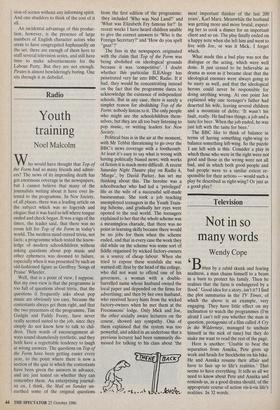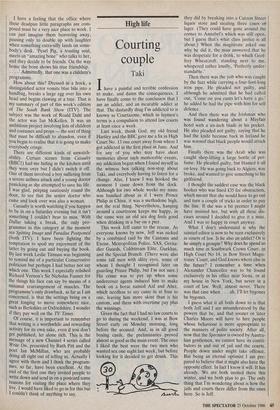Television
Not in so many words
Wendy Cope
itten by a rabid skunk and fearing madness, a man chains himself to a beam in a barn to protect his familY. Then he realises that the farm is endangered by a flood.' Good idea for a story, isn't it? I find the plot summaries in the' TV Times, of which the above is an example, very engaging. They have little effect on my inclination to watch the programmes (Pm afraid I can't tell you whether the man in question, protagonist of a film called A Cry in the Wilderness', managed to unchain himself in the nick of time) but they do nuke me want to read the rest of the page.
Here is another: 'Unable to bear the separation from Annika, Pete gives up work and heads for Stockholm on his bike. He and Annika resume their affair and have to face up to life's realities.' That seems to have everything. It tells us all we need to know about Pete and Annika and reminds us, as a good drama should, of the appropriate course of action vis-à-vis life's realities. In 32 words.
'B
I have a feeling that the office where these deadpan little paragraphs are com- posed must be a very nice place to work. I can just imagine them beavering away, pausing only to double up with laughter when something extra-silly lands on some- body's desk. 'Pearl pig, a trusting soul, meets an "amazing bone" who talks to her, and they decide to be friends. On the way home the bone shows his true friendship. . • . .' Admittedly, that one was a children's programme.
How about this? Dressed in a frock, a distinguished actor vomits blue bile into a handbag, breaks a large egg over his own head and begins clawing at a tree. That is my summary of part of this week's edition of The South Bank Show (ITV). The subject was the work of Roald Dahl and the actor was Ian McKellen. It was an ambitious project involving lots of children and costumes and props — the sort of thing that must be difficult to abandon, even if you begin to realise that it is going to make everybody cringe.
There are different kinds of unwatch- ability. Certain scenes from Casualty (BBC1) had me hiding in the kitchen until they were over but I didn't switch it off. One of them involved a boy suffering from a severe asthma attack and a young doctor panicking as she attempted to save his life. I was glad, peeping cautiously round the door, to see that the senior doctor who came and look over was also a woman.
Casualty is worth watching if you happen to be in on a Saturday evening but it isn't something I couldn't bear to miss. With Dallas taking a break, the only pro- grammes in this category at the moment are Spitting Image and Paradise Postponed (both ITV). I have been fighting the temptation to spoil my enjoyment of the latter by going out and buying the book. By last week Leslie Titmuss was beginning to remind me of a particular Conservative Politician but perhaps I had better not say Which one. This week I especially relished Richard Vernon's Sir Nicholas Fanner for the things his face can say by means of a minimal rearrangement of muscles. The Programme's only drawback, as far as I am concerned, is that the settings bring on a great longing to move somewhere nice, such as Berkshire or Oxfordshire. I wonder if they pay well on the TV Times.
Of course, it is important to remember that writing is a worthwhile and rewarding activity for its own sake, even if you don't get published, let alone rich. 'This is the message of a new Channel 4 series called Write On, presented by Ruth Pitt and the poet Ian McMillan, who are probably doing all right out of telling us. Actually I agree with them and I think the program- mes, so far, have been excellent. At the end of the first one they invited people to write down and send in on a postcard some reasons for visiting the place where they live. I would have liked to go in for this but I couldn't think of anything to say.



























































 Previous page
Previous page